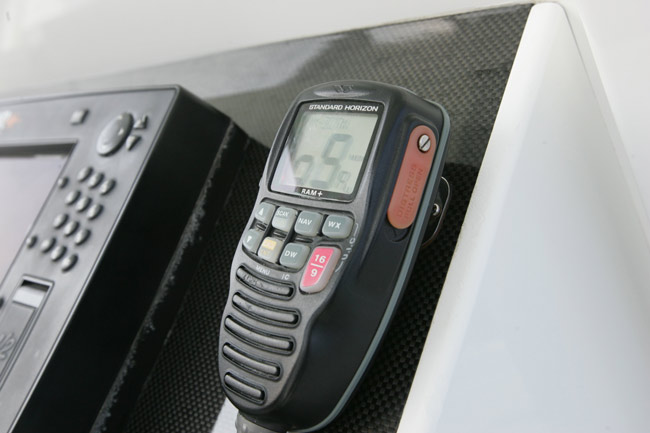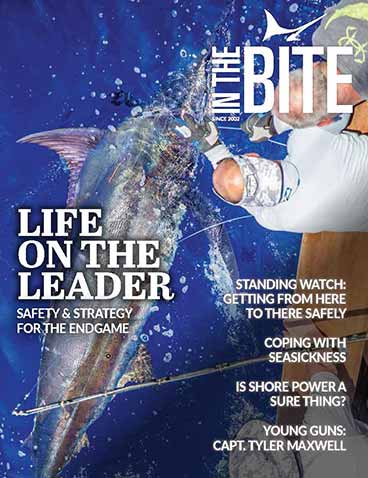A day late and a dollar short – weve all heard the saying and have probably muttered a red faced should have been here yesterday many times to our bosses and crew. The fact is fish have tails, and they are going to use them. A place where fish were in abundance the day before can inexplicably become a virtual desert over-night – and vice-versa. That why on the water networking and communication can be a necessity to tracking and catching fish making the VHF radio one of our greatest on-board tools. I hit the docks to better understand how today teams use their radio, and other communication tools, as well as understand the norms for their use. My radio is probably the most important fishing tool on the boat explained Captain Willy Zimmerman who captained the 60 Custom Carolina Playmate for the past several seasons off of Ocean City, Md. Everyone tends to branch out in the morning to try and figure out how the water has moved and how the fishing has changed since the day before. Keeping a keen ear to that microphone will often point you in the right direction. Captain Bob Watson of the 54 Viking Fuujin based out of Los Suenos agrees. I do a lot of listening, especially on the way out. We end up fishing a wide area here and try to work together to let each other know what we see. Captain Josh Ruskey keeps a note pad close by during the morning run. I take notes on a pad on where everyone will be starting in the morning, then if you hear them in a discussion, and theyve have had some bites, you can deduce where it might be added Ruskey. Captain Daniel Spencer who runs the 66 Spencer Yacht tournament boat has an ace up his sleeve in regards to keeping tabs on his competition. The new systems we have on the bridge make it really easy to stay in touch with what going on. As Im listening on the radio on the way out, and watching where everyone running, I can use the ARPA (Automatic Radar Plotting Aid) to tag objects with a name. As long as they stay within a certain distance of me, Ill know exactly who each radar blip that Ive tagged is even if I cant see them.

Here is a sample screen of radar watchkeeping
 So how do captains determine which channels to monitor? Every region does have its local standby channel, usually broken down by inlet added Faucet. Nowadays however it seems that some guys change channels every day. Youve got to pay attention to keep up, and figure out what channel to monitor from chatter on the dock in the morning remarked Spencer. Often times however non-typical channels are selected to keep clutter off the main channels. This doesnt mean good fishing information wont be shared as well though. It seems like each group of buddies will have a side channel they use to tell bad jokes all day wherever you go added Watson. Most of my buddies are Raven fans, so well pick channels based on player jersey numbers added Ruskey. Anyone that figures it out usually just gets to hear my buddy Tucker singing to me though.
The desire for privacy has led many captains to use other communication tools besides the Vhf radio. Here in South Florida were fishing within cell phone reception fifty percent of the time, and it gets a good deal more attention than the radio explained Faucet. We used to use the Nextel walky-talky function, but now most of us are just sending texts back and forth all day so theyre still received when we pop back into reception. In the canyons of the northeast, where cell phone reception is unavailable, crews are using satellite phones with regular occurrence. Radios are limited in how far they can talk. And when you can run forty knots, it isnt out of the question to pick up and run forty miles in the middle of the day if someone has found fish outside of your radio reception explained Spencer. There also the fact that a private telephone call is more likely to receive a straightforward answer since it sheltered from outside ears.
Is there any etiquette for declaring bites and sharing information on the radio? That a really touchy area. If you dont broadcast a bite people will get on you for clamming up, and when you do broadcast all of your bites, other guys will beat on you for bragging. There a very fine line of playing to the personalities of the people youre working with explained Zimmerman. Sometimes choosing how to relay bites will depend on how the day is going. Youve got to try and call your buddies if they need it that day, but youve got to keep information short and simple, otherwise it can come off the wrong way added Spencer. It best to remember weve got two ears and one mouth so we should listen twice as much as we talk. Just fill in the blanks back at the dock. Most of the captains liked to catch a couple before relaying the info. It puts you in a bad spot when you relay a couple bites and then it shuts off. I try not to speak too soon, but if I get a handful, Ill let people know remarked Ruskey. Timing can play a role too. Early in the day when were searching everyone is talking back and forth, but towards the end of the day, when nobody got the time to run anywhere else, the radio gets quieter added Ruskey. Often the best information comes from interpretation. When you get to know the people youre fishing around, it what not said, that may be the answer youre really looking for. added Watson.
Not sharing equal information or clamming was unequivocally considered the most undesirable radio trait. Not saying a thing when youre sacking them up and everyone else is struggling just isnt right remarked Ruskey. Youve got to share information if you want to get it added Faucet. Likewise, broadcasting another boats location after they called you in was considered taboo. If I have a reason to Ill put my numbers on the air but never anyone else explained Watson. In fact it was stressed that anyone worth their salt will be keeping tabs on where other boats are throughout the day. Asking for reports or directionality is acceptable, but direct requests on location are considered amateur. A decent captain should be able to keep tabs on who backing down and circling on the horizon. If you can see me I shouldnt have to call you added Zimmerman. If another boat is kind enough to call you in on a bite, it also considered good manners to put your lines in a half mile away and work in towards the bite rather than running to their transom. If you can hear them talking in their cockpit youre too close. Besides they just caught that fish and it your job to find another added Ruskey. And broadcasting blatantly bad information, or just plain talking too much, will quickly garner a nickname or bad reputation.
And then there tournament time where radio talk seems to be muffled through a filter. Descriptions of bites, observations, and locations become subdued or even muted. Oftentimes the best information is the declaration of bites on the tournament channel, where it the fleet job to figure out where. One individual explained that his boss certainly wouldnt appreciate him calling the fleet in during a tournament, while another stressed that if he didnt end up winning the tournament himself, he sure wished it was at least one of his friends. It was also noted that in recent years, as competition increases, less information was shared – not only during tournaments, but on a daily basis. Regardless, if you plan on staying competitive, you better keep one, or both ears, glued to that Vhf, cell phone, or whatever communication tool predominates in your region!
So how do captains determine which channels to monitor? Every region does have its local standby channel, usually broken down by inlet added Faucet. Nowadays however it seems that some guys change channels every day. Youve got to pay attention to keep up, and figure out what channel to monitor from chatter on the dock in the morning remarked Spencer. Often times however non-typical channels are selected to keep clutter off the main channels. This doesnt mean good fishing information wont be shared as well though. It seems like each group of buddies will have a side channel they use to tell bad jokes all day wherever you go added Watson. Most of my buddies are Raven fans, so well pick channels based on player jersey numbers added Ruskey. Anyone that figures it out usually just gets to hear my buddy Tucker singing to me though.
The desire for privacy has led many captains to use other communication tools besides the Vhf radio. Here in South Florida were fishing within cell phone reception fifty percent of the time, and it gets a good deal more attention than the radio explained Faucet. We used to use the Nextel walky-talky function, but now most of us are just sending texts back and forth all day so theyre still received when we pop back into reception. In the canyons of the northeast, where cell phone reception is unavailable, crews are using satellite phones with regular occurrence. Radios are limited in how far they can talk. And when you can run forty knots, it isnt out of the question to pick up and run forty miles in the middle of the day if someone has found fish outside of your radio reception explained Spencer. There also the fact that a private telephone call is more likely to receive a straightforward answer since it sheltered from outside ears.
Is there any etiquette for declaring bites and sharing information on the radio? That a really touchy area. If you dont broadcast a bite people will get on you for clamming up, and when you do broadcast all of your bites, other guys will beat on you for bragging. There a very fine line of playing to the personalities of the people youre working with explained Zimmerman. Sometimes choosing how to relay bites will depend on how the day is going. Youve got to try and call your buddies if they need it that day, but youve got to keep information short and simple, otherwise it can come off the wrong way added Spencer. It best to remember weve got two ears and one mouth so we should listen twice as much as we talk. Just fill in the blanks back at the dock. Most of the captains liked to catch a couple before relaying the info. It puts you in a bad spot when you relay a couple bites and then it shuts off. I try not to speak too soon, but if I get a handful, Ill let people know remarked Ruskey. Timing can play a role too. Early in the day when were searching everyone is talking back and forth, but towards the end of the day, when nobody got the time to run anywhere else, the radio gets quieter added Ruskey. Often the best information comes from interpretation. When you get to know the people youre fishing around, it what not said, that may be the answer youre really looking for. added Watson.
Not sharing equal information or clamming was unequivocally considered the most undesirable radio trait. Not saying a thing when youre sacking them up and everyone else is struggling just isnt right remarked Ruskey. Youve got to share information if you want to get it added Faucet. Likewise, broadcasting another boats location after they called you in was considered taboo. If I have a reason to Ill put my numbers on the air but never anyone else explained Watson. In fact it was stressed that anyone worth their salt will be keeping tabs on where other boats are throughout the day. Asking for reports or directionality is acceptable, but direct requests on location are considered amateur. A decent captain should be able to keep tabs on who backing down and circling on the horizon. If you can see me I shouldnt have to call you added Zimmerman. If another boat is kind enough to call you in on a bite, it also considered good manners to put your lines in a half mile away and work in towards the bite rather than running to their transom. If you can hear them talking in their cockpit youre too close. Besides they just caught that fish and it your job to find another added Ruskey. And broadcasting blatantly bad information, or just plain talking too much, will quickly garner a nickname or bad reputation.
And then there tournament time where radio talk seems to be muffled through a filter. Descriptions of bites, observations, and locations become subdued or even muted. Oftentimes the best information is the declaration of bites on the tournament channel, where it the fleet job to figure out where. One individual explained that his boss certainly wouldnt appreciate him calling the fleet in during a tournament, while another stressed that if he didnt end up winning the tournament himself, he sure wished it was at least one of his friends. It was also noted that in recent years, as competition increases, less information was shared – not only during tournaments, but on a daily basis. Regardless, if you plan on staying competitive, you better keep one, or both ears, glued to that Vhf, cell phone, or whatever communication tool predominates in your region!
“Tongue-in-cheek” Guide to Radio Speak
What’s said = Real Meaning “I’ve had a couple bites” : “They’re biting pretty good” “We’ve seen a few fish” : “we’ve had them eating steady at the transom” “I’m going to start right near you” : “When you make a left out the inlet i’ll take a right” “That smoke behind my boat is just the boss and his cigars” : “We’re backing down on them so hard you could mistake our smoke for a small forest fire” “Fishing Sucks today” : “Fishing Sucks Today” A sneeze, cough or whistle; go to the secret channel so I can tell you to work your way over here “You getting any bites over there?” : “We can’t catch crap over here” “*radio silence” : “they’re biting pretty good you better get here” For More Award Winning Featured Stories Click Here













